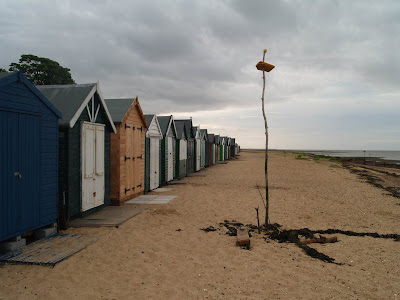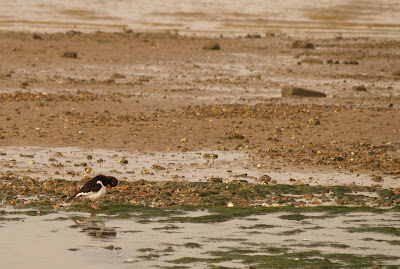Monthly Archives: July 2008
TBTM20080706
TBTM20080705
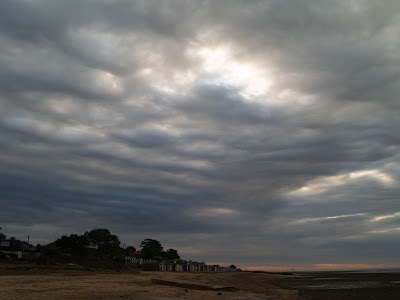
As 9/11 conspiracies are in the news again, here is a site which gathers together all the live coverage on the day.
There is no way on earth that Tower 7’s collapse was caused by fire!
Wot no TBTM?
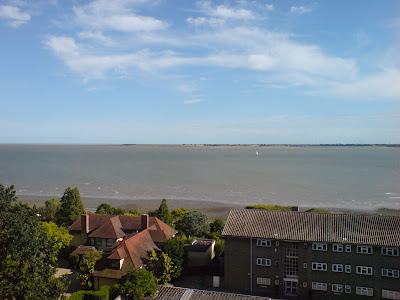
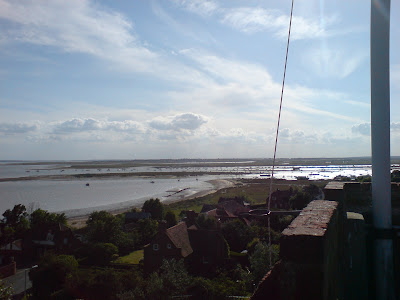
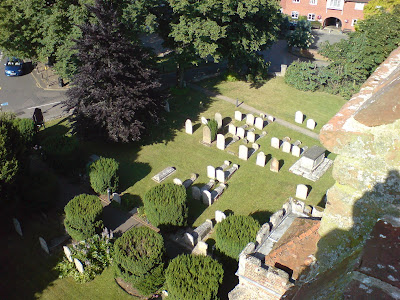
Bit of a strange morning today – overslept by several hours and then spent several hours in the local A&E department for our youngest – all is well, thanks be to God. So no TBTM. However, I did get to wander up to the top of West Mersea church tower, for the first time ever, and take a few photos (with my phone camera; I’ll go up again some time soon with my proper one to take some more).
Declarations from Jerusalem
Our church is presently being disturbed by two separate but inter-linked arguments, over whether to allow women bishops, and whether to allow gay bishops.
I want to concentrate in this post on the latter question because one of the points made in various discussions is that there is no question that women are, as such, existing in a condition of sin. The argument is that allowing women to become bishops, whatever its justification otherwise, does not amount to giving unrepentant sinners authority in the church community. Whereas, appointing an openly gay and non-celibate man as a bishop (eg Gene Robinson) does do this.
I want to begin from the premise that Scripture and tradition describe homosexual behaviour as sinful. I would note that there are various problems with this (eg ‘homosexuality’ as we understand it is unknown in Scripture) but I don’t think my fundamental point is altered by accepting this as a common starting point. Also, for the avoidance of red herrings, let us take it that ‘homosexual behaviour’ refers to sexual behaviour between two men or two women in the context of a socially accepted monogamous covenant (eg civil partnerships), so there are no questions of promiscuity or adultery and so on.
Those who reject the consecration of Gene Robinson argue that, as Scripture and tradition forbid homosexual behaviour, and condemn it in strong terms, it is impossible to accept such an unrepentant sinner in a position of authority. To do so undermines any sense that those in authority in the church can exercise such authority – for their very status and role undermine whatever else they might do.
I think this argument is logical. However, as with lots of logical arguments, the issue is in whether the premises of the argument are true. That is, is it true that homosexual behaviour is a sin?
Denying that homosexual behaviour is a sin can take various forms.
Firstly, it does seem that some circles within the Anglican Communion have retreated from any sense of ‘sin’ as a viable concept at all. We can call this the Liberal perspective. To my mind it is a form of words that Christianity cannot do without, as it describes essential elements of the faith. Where this doctrine is preached then it seems to me that a substantial argument can be made that classical Anglican Christianity has been abandoned.
However, there are other ways to deny that homosexual behaviour is a sin, and, rather wonderfully, we are shown one such way in Scripture, when there are discussions at Jerusalem about how far to preserve obedience to the dietary laws of Moses (see Acts 10 & 11 for the discussion, and Leviticus 11 & Deuteronomy 14 for the original law). Within the inherited tradition of Judaism obedience to these laws is seen as essential for the members of the community. To not keep these laws demonstrated that you were no longer a member of the community in good standing, you were ‘unclean’ – and consequently there could be no prospect of people in positions of leadership being accepted if they rejected these laws. They simply could not be holy.
However, as a result of Peter’s vision, and the experience of interacting with the Gentile converts, the council in Jerusalem accepted that Gentiles did not need to adhere to the dietary laws in order to be saved, and to be full members of the Christian community. This was an incredibly radical decision. Scripture and tradition were unanimous that the dietary laws had to be observed, yet this church council put Scripture and tradition to one side in order to allow the Spirit to determine the right way forward. “So if God gave them the same gift as he gave us, who believed in the Lord Jesus Christ, who was I to think that I could oppose God?” says Peter.
In other words, we know from Scripture that the church itself is given authority to act according to the Spirit. Undoubtedly the early church was drawing on teaching from Jesus himself. Jesus warns his disciples that there are some implications of his teaching that they cannot yet bear, but that the Spirit will come upon them to lead them into the truth (John 16). He also teaches them, particularly Peter, that they will have authority to determine what is permissible and forgiveable, and what is not (Matthew 16.19 & John 20.22-23).
It therefore seems possible to me that the church can determine that what was once considered to be a sin shall no longer be considered to be a sin – even when Scripture and Tradition say that it is. I think that it is essential to separate this perspective from that of the Liberal one described above, for the reasoning comes from completely separate roots. This latter perspective – let’s call it ‘Catholic’ for the time being – is best characterised as being driven by a very high doctrine of the present reality of the Holy Spirit, ie an expectation that the Spirit is present with us now and able to guide our deliberations and decisions in these matters. It is also, of course, a distinctly non-protestant perspective because, by definition, it allows for a higher authority than Scripture. Which again, is not too problematic, for it follows on from Jesus’ own teaching of the distinction between himself as the Word of God and source of salvation, and the Scriptures’ role as a testimony to him, not a source of eternal life in themselves (John 5.39).
I believe that two things need to be present for this latter position to be defensible. The first is that the ‘fruits of the Spirit’ need to be present amongst those who are, prima facie, unrepentant sinners. This requires prayerful and open hearted observation and listening, as called for by the Lambeth conference in 1998. It also requires an acceptance by the church community, by the consensus fidei.
Which is the real reason why these issues have now come to a head. The Anglican Communion has not yet established any means by which the consensus fidei can be determined. That is what the Windsor process is all about – setting up a mechanism by which the questions can be resolved.
Now it may well be that there is no consensus fidei possible; that there are in fact such differences on this question that there can be no reconciliation between those who see homosexual behaviour as sinful and those who no longer see it in the same way. What I don’t see as helpful is lumping together the ‘Liberal’ perspective with the ‘Catholic’ perspective, and treating them both as heretical.
I think that it is true that what is at stake here is the status of Scripture, whether it is the final authority or not. However, it is possible to reject Scripture as a final authority on Liberal grounds, and also on Catholic (or orthodox!) grounds. In other words, what we may be seeing here is the death throes of Protestantism in England…
More on that last point at another time.
Why am I a Christian?
James has been pressing me on why I am a Christian as opposed to any other sort of religious person. These are some more-or-less connected thoughts.
1. I said to my sponsoring bishop that if I had been brought up in another culture, I’d still be the equivalent of a priest in the terms of that culture. If it was prehistoric I’d be a shaman, if in a Buddhist country I’d be a monk and so on. In other words I suspect there to be a large genetic component in my vocation, which would have found an appropriate outlet whatever the culture (and note, I don’t think there are any cultures without such an outlet, which is significant).
2. Following on from that, I think a large part of the answer as to why I am a Christian as opposed to following an alternative faith is exactly the same reason why I speak English rather than French or Mandarin: this is the culture that I have grown up in. Despite the atheist onslaught of the last two hundred years or so, the roots of our culture remain Christian. As soon as I started to explore the religious dimensions of life in any depth I was led to explore Christianity.
3. Obviously my religious experience has some relevance for this, but only in that the experience was mediated/understood using the Christian categories which I had absorbed from the culture and education, or which were presupposed by them.
4. It’s possible that the different faiths are paths up the same mountain, with the same destination. It’s also possible that they are paths up the same mountain, but some paths reach to the summit whilst some do not. I am open to the idea that to reach the summit “Christianity” would need to be left behind. I understand that, as a Christian, by distinguishing between Jesus and the religion formed in his name. In other words, I would still hold Jesus to be the summit of the mountain.
5. I consider it to be a snare and a delusion to engage very much time in ‘which is the best path’? The essential thing is to start climbing the mountain, to grow in understanding and holiness. Trying to work out which is the ‘best’ is a displacement activity. You can’t work out which is ‘best’ except from the top of the mountain.
6. We are formed by the presuppositions of our culture in profound ways, not least through our language. Running with the grain of the culture (ie in the West, pursuing Christianity) makes for an easier beginning in the path of faith.
That’ll do for now.
TBTM20080703
Darth Thriller
TBTM20080702
Which I link to despite becoming more persuaded recently that marijuana is very dangerous. I just don’t think that heavy handed governments are the answer to anything.
Strood drama

PICTURE(S): COPYRIGHT STEPHEN HUNTLEY/RON JAMES/ESSEX-PIX.COM..29/6/08
Nasty accident on the Strood yesterday, with a car going through the side crash barriers into the mud (you can see the car if you look closely). If the tide had been in…
Picture via the friend of this blog standing in the foreground :o)


